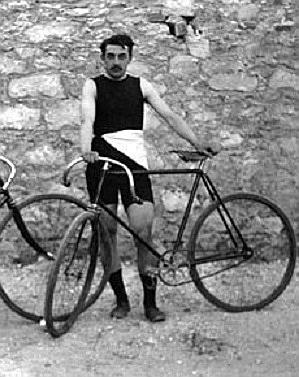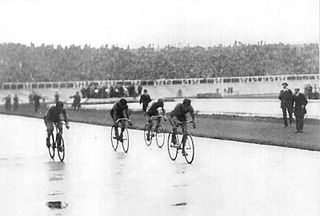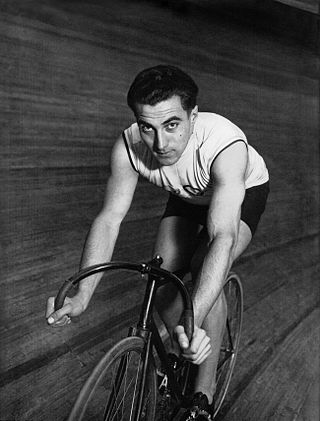
The 1896 Summer Olympics, officially known as the Games of the I Olympiad and commonly known as Athens 1896, was the first international Olympic Games held in modern history. Organised by the International Olympic Committee (IOC), which had been created by French aristocrat Pierre de Coubertin, it was held in Athens, Greece, from 6 to 15 April 1896.

The men's points race in cycling at the 2004 Summer Olympics consisted of a 160 lap points race with 16 sprints where points were awarded. The event was held on 24 August 2004 at the Athens Olympic Velodrome. There were 23 competitors from 23 nations, with each nation limited to one cyclist in the event. The event was won by Mikhail Ignatiev of Russia, the nation's first victory in the men's points race. Spain's Joan Llaneras, the defending champion, took silver; he was the first and only person to win multiple medals in the relatively short-lived points race, and ended with three medals after another gold in 2008. Guido Fulst of Germany took bronze, the first medal in the event for that nation since 1900.

Paul Michel Pierre Adrien Masson was a French cyclist who raced at the 1896 Summer Olympics in Athens.
Stamatios Nikolopoulos was a Greek racing cyclist. He competed at the 1896 Summer Olympics in Athens winning two silver medals.

Felix Adolf Schmal was an Austrian fencer and racing cyclist. He was born in Dortmund and died in Salzburg. He competed at the 1896 Summer Olympics in Athens.
Edward Battell was a British racing cyclist. He competed at the 1896 Summer Olympics in Athens.
Frederick Keeping was a British racing cyclist. He competed at the 1896 Summer Olympics in Athens.

Marie Léon Flameng was a French cyclist and a World War I pilot. He competed at the 1896 Summer Olympics in Athens, winning three medals including one gold.
Pursuit racing is where two or more competitors are either chasing after each other or chasing after a lead competitor or team.

The men's time trial was one of 5 track cycling events on the Cycling at the 1896 Summer Olympics programme. It was the fourth event on the cycling schedule and was held on 11 April. The first time trial competition was the only time that Olympic time trials were held over the distance of one-third of a kilometre; when the event returned to the programme at the 1928 Summer Olympics the distance was set at one kilometre.

The men's sprint was one of the five track cycling events on the Cycling at the 1896 Summer Olympics programme. It was held on 11 April as the second event on the schedule. It was held over the distance of 2 kilometres, or six laps of the track. The event was won by Paul Masson of France, with his teammate Léon Flameng earning bronze. Stamatios Nikolopoulos of Greece took silver

The men's 100 kilometres was one of five track cycling events on the Cycling at the 1896 Summer Olympics programme. It was the first race held, on 8 April. It required cyclists to complete 300 circuits of the track. Nine cyclists from five nations competed. The event was won by Léon Flameng of France, with Georgios Kolettis of Greece coming in second.

The men's 12 hour race was one of five track cycling events on the Cycling at the 1896 Summer Olympics programme. It was the final event of the 1896 Summer Olympics, ending at 5 p.m. on 13 April. Seven cyclists from four nations started. The event was won by Adolf Schmal of Austria, the only gold medal in cycling ever won by the nation, until Anna Kiesenhofer's win in the 2020 Women's Road Race. Schmal lapped silver medalist Frederick Keeping of Great Britain early, winning by that lap as the two were the only riders to finish. The 12 hour race was the last event to finish at the 1896 Games.

The men's sprint was one of the three cycling events, all track cycling, now regarded as "Olympic" on the Cycling at the 1900 Summer Olympics programme. It was held on 11 September and 13 September. The sprint, a 2000-metre race with 1000-metre heats, was conducted in four rounds. 69 of the 72 cyclists competed in the sprint, including cyclists from all six competing nations. The event was won by Albert Taillandier of France, with his countryman Fernand Sanz in second place. John Henry Lake of the United States won the nation's first cycling medal with his bronze.

The men's 25 kilometres was one of three cycling events, all track cycling, on the Cycling at the 1900 Summer Olympics programme that were open to all amateurs, had more than one nation participating and no handicapping. It was held on 15 September. Ten cyclists competed. Four had already competed in the sprint event. The result of the race proved Louis Bastien of France to be the top long-distance cyclist present, while Lloyd Hildebrand finished in second and Auguste Daumain in third. One of the contestants, Louis Trousselier, would go on to win the 1905 Tour de France. Prizes were awarded to the top four finishers: art objects valued at 400 francs, 300 francs, 200 francs (third), and 100 francs (fourth).

The men's sabre was one of three fencing events on the Fencing at the 1896 Summer Olympics programme. It was held on 9 April, the fourth day of competition. The event was won by Ioannis Georgiadis of Greece, with his countryman Telemachos Karakalos. Holger Nielsen of Denmark finished third.

The men's 100 kilometres was one of seven track cycling events on the Cycling at the 1908 Summer Olympics programme. Its distance was the longest of the individual event distances. A challenge cup was presented by the Prince of Wales to the winner. There were 43 competitors from 11 nations. Each nation could enter up to 12 cyclists. The event was won by Charles Henry Bartlett of Great Britain, with his countryman Charles Denny finishing second. Octave Lapize earned bronze, making France the only nation to have medalists at both appearances of the 100 kilometres race.

The men's points race was an event at the 2000 Summer Olympics in Sydney, Australia. There were 23 participants from 23 nations competing in the final, which was held on 20 September 2000. Each nation was limited to one cyclist in the event. The event was won by Joan Llaneras of Spain, the nation's first medal in the men's points race. Silver went to Milton Wynants of Uruguay and bronze to Aleksei Markov of Russia; those nations also earned their first medals in the event.

The men's points race at the 2008 Summer Olympics took place on August 16 at the Laoshan Velodrome. There were 23 competitors from 23 nations. The event was won by Joan Llaneras of Spain, his second victory in the points race and third consecutive medal in the event. Llaneras was the only person, of any gender, to win multiple medals in the points race, which is no longer on the Olympic programme. His two gold medals made Spain only the second nation to win multiple golds in the men's event; Italy had three. Silver went to Roger Kluge of Germany. Great Britain earned its first medal in the men's points race with Chris Newton's bronze.

The men's sprint at the 1928 Summer Olympics took place at the Olympic Stadium in Amsterdam. There were 18 competitors from 18 nations, with each nation limited to one cyclist. The event was won by Roger Beaufrand of France, the nation's second consecutive and fourth overall victory in the men's sprint. Antoine Mazairac of the Netherlands, the only other nation to have won a gold medal in the event, put the Dutch team on the podium for the third consecutive Games with his silver. Willy Hansen earned Denmark's first medal in the event, with his bronze.















